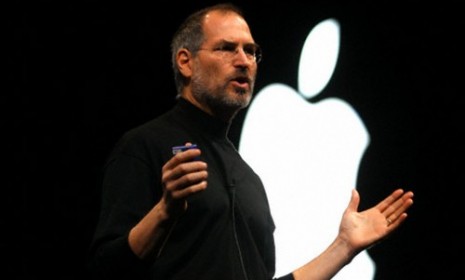Apple and AT&T's abusive relationship: 5 fun facts
Wired's Fred Vogelstein shines a light on the troubled pact between Apple and its exclusive cellular carrier for iPhones and iPads. Here are the biggest revelations

A free daily email with the biggest news stories of the day – and the best features from TheWeek.com
You are now subscribed
Your newsletter sign-up was successful
The relationship between Apple, maker of the iPhone, and AT&T, its exclusive network carrier, was once heralded as a "groundbreaking alliance" between technology and communications, writes Fred Vogelstein in this month's issue of Wired. But that union has now descended into a "loveless celebrity marriage." In a detailed investigation, Vogelstein charts the many disagreements between the two, and reveals that Apple's secretive stubbornness doomed the relationship — and contributed to the iPhone's failures — right from the very start. Here are 5 revelations:
1. Apple is partly to blame for the dropped calls issue
Almost everyone blames the number of dropped calls on the iPhone on AT&T's poor network coverage. But, says Vogelstein, the Apple cell phone's main radio was "full of bugs," and was sourced from Europe, where cell towers are closer to each other than in the U.S. Not only did Apple not acknowledge that — it also repeatedly refused to set limits on bandwidth-heavy iPhone apps while AT&T upgraded its network. "For Apple, the idea of restricting the iPhone was akin to asking Steve Jobs to ditch the black turtleneck."
The Week
Escape your echo chamber. Get the facts behind the news, plus analysis from multiple perspectives.

Sign up for The Week's Free Newsletters
From our morning news briefing to a weekly Good News Newsletter, get the best of The Week delivered directly to your inbox.
From our morning news briefing to a weekly Good News Newsletter, get the best of The Week delivered directly to your inbox.
2. AT&T's board of directors were not granted a preview of the iPhone
"Shockingly," writes Vogelstein, AT&T's board of directors saw the iPhone for the very first time when it was launched to the rest of the world. Only a "handful of top AT&T execs" were shown the product before January 2007.
3. AT&T announced iPhone "tethering" without telling Steve Jobs
The ability to use your cell phone as a wireless modem, or "tethering," is offered by many carriers. But iPhone and AT&T "were at an impasse over it for at least two years," says Vogelstein. AT&T wanted users to pay extra for it, but Apple wanted it to be included in the flat-rate data plan. Eventually, AT&T exec Ralph de la Vega announced tethering at a San Fransisco wireless convention — but before an agreement had been made. Jobs was "absolutely livid" about it, a source tells Wired, ranting about what a "stupid company AT&T was."
A free daily email with the biggest news stories of the day – and the best features from TheWeek.com
4. Apple has been looking at making a deal with Verizon since 2007
The iPhone had only been on sale a few months when Apple began looking at network alternatives to AT&T. According to Vogelstein, Jobs began researching options to strike a deal with Verizon as early as late 2007, even sending executives to meet with Verizon's hardware providers. But, fearing a "nasty lawsuit," Apple didn't ink anything.
5. AT&T tried to make Steve Jobs wear a suit
When an AT&T rep suggested to one of Steve Jobs' aides that the CEO wear a suit to meet AT&T's board of directors, he was told: "We're Apple. We don't wear suits."
-
 6 of the world’s most accessible destinations
6 of the world’s most accessible destinationsThe Week Recommends Experience all of Berlin, Singapore and Sydney
-
 How the FCC’s ‘equal time’ rule works
How the FCC’s ‘equal time’ rule worksIn the Spotlight The law is at the heart of the Colbert-CBS conflict
-
 What is the endgame in the DHS shutdown?
What is the endgame in the DHS shutdown?Today’s Big Question Democrats want to rein in ICE’s immigration crackdown